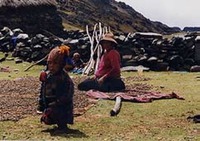The unequal distribution of profits, exploitation, and other unfair practices that are common in the trade between North and South, are multiplied in illicit drug business. The profit margin for the dealers of the North is manifold compared with the farmers of the South, who more often than not profit less than one per cent of the final product’s retail price. In fact, drug traffic is surprisingly similar to the legal global trade, where ruthless exploitation seems to be the norm.
For instance, when the price of coffee on the world-market plummeted in 2002, coffee cultivation in many areas became useless since the production costs would have been higher than the prices offered for the raw produce. This is exactly what happened for instance in Colombia, Mexico and Peru. Thus it is no wonder that numerous farmers turned to drug cultivation instead, for many of them it was a question of plain survival.*)
If the world-market prices for agricultural products were fair, the current need and there would be less interest to cultivate drugs. Therefore the responsibility and power to change things is in the hands of the consumer; just as you can boycott multinational corporations by not buying their products, you can stay clear from drugs. If there was no demand for drugs in the West, the people in the developing countries could grow something more beneficial to themselves, like food.
Boycotting drugs alone is not enough to help the farmers of the South; you should favor, for example, Fair Trade-products too. The rules of global economy must be changed.
Drug cultivation, along with the other crops cultivated almost exclusively for export, has a negative effect on domestic agricultural production, and is increasingly destroying the environment. Who and what would you rather support if the choice comes down to local production and fair global trade on one side, and multinational corporations and international mafia on the other?
*) For example the EU agricultural subsidies to member states, the US dumping of its grain-surplus to developing countries, and the WTO agricultural pact all make the situation worse.
